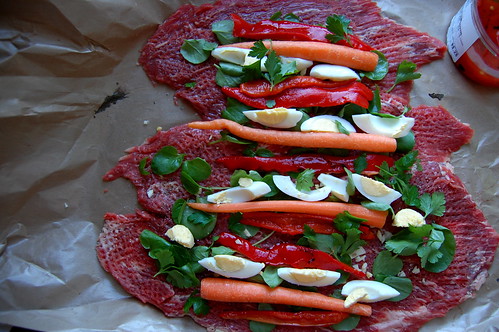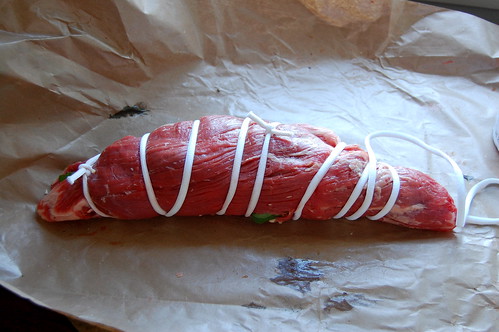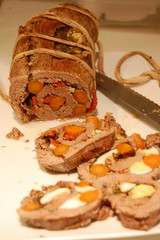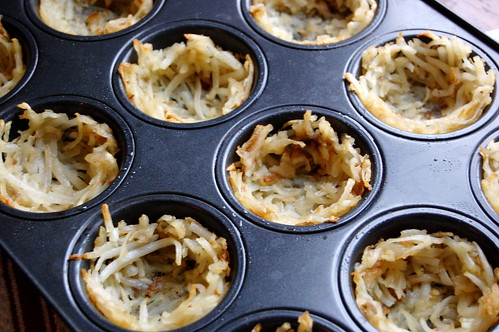 I'll admit that I made this recipe out of culinary curiosity rather than any desire to eat flank steak. Matambre, a rolled stuffed flank steak is a classic of Argentine cuisine. A friend mentioned that she had made it back in the seventies, when cooking unusual international dishes was all the rage. I realized that I'd never made it myself, and though I'll admit to not adoring matambre, I thought I'd give it a go.
I'll admit that I made this recipe out of culinary curiosity rather than any desire to eat flank steak. Matambre, a rolled stuffed flank steak is a classic of Argentine cuisine. A friend mentioned that she had made it back in the seventies, when cooking unusual international dishes was all the rage. I realized that I'd never made it myself, and though I'll admit to not adoring matambre, I thought I'd give it a go.The difficulty with matambre is that flank steak is a tough cut of meat best suited to quick cooking. However, matambre is a lengthy stew, and it's sometimes difficult to identify when it gets tender. I've heard that Argentine butchers cut the steak differently than American butchers, which makes it more suitable to slow cooking. However, when the steak is pounded, marinated, and stewed long enough it can be soft tender and flavorful.


The traditional stuffing for matambre is carrots, spinach, roast red pepper, and hard-boiled eggs. Argentines put hard-boiled eggs into lots of meat dishes, but frankly, I think it's weird and adds nothing here, for the white color feel free to substitute parsnips or turnips instead. Matambre is traditionally served at room temperature or cold with chimichurri sauce. It's a good dish for a buffet since it can be made ahead and looks beautiful on a platter.


Matambre (Stuffed Rolled Flank Steak)
I highly recommend having your butcher butterfly the steak for you- it is difficult to do well, and you don't want to have holes in your steak or the roll may fall apart. The spinach helps the stuffing adhere together.
1 2-pound flank steak, butterflied length-wise
for the marinade: red wine, garlic slivers, a dash of soy sauce and cayenne pepper
a handful of spinach leaves (arugula or watercress also works)
3-4 very skinny carrots
1 roasted red pepper, cut into strips
2 hard-boiled eggs, quartered, or sliver of parsnip or turnip
2 cups beef broth
3 cloves garlic
salt and pepper to taste
1. Pound out the butterflied steak until even and tenderized. Place in a plastic bag or dish with red wine, garlic, soy sauce, and pepper to cover and marinate overnight.
2. Preheat oven to 300 F. Drain steak, discarding marinade, and place on a work surface. Scatter spinach leaves over steak. Align the carrots, red pepper, and eggs/parsnips lengthwise along the steak. Carefully roll up the steak and tie it firmly. Trim any ragged ends from the roll.
3. Heat a nice glug of oil in a dutch oven large enough to hold the roulade. Add the steak and sear on all sides until browned. Add the beef stock, the garlic cloves, and enough water to come 2/3 of the way up the side of the roulade.
4. Place in the oven and roast, covered, for 2 hours, turning the steak occasionally. Test the steak for done-ness starting at the 1.5 hour mark. You may want to slice-off a bit of steak and taste it.
5. Remove the steak from the liquid (don't discard it- strain it and keep as broth). Let cool, then slice the roulade as thinly as possible. Serve slightly warm or at room temperature with chimichurri sauce.












